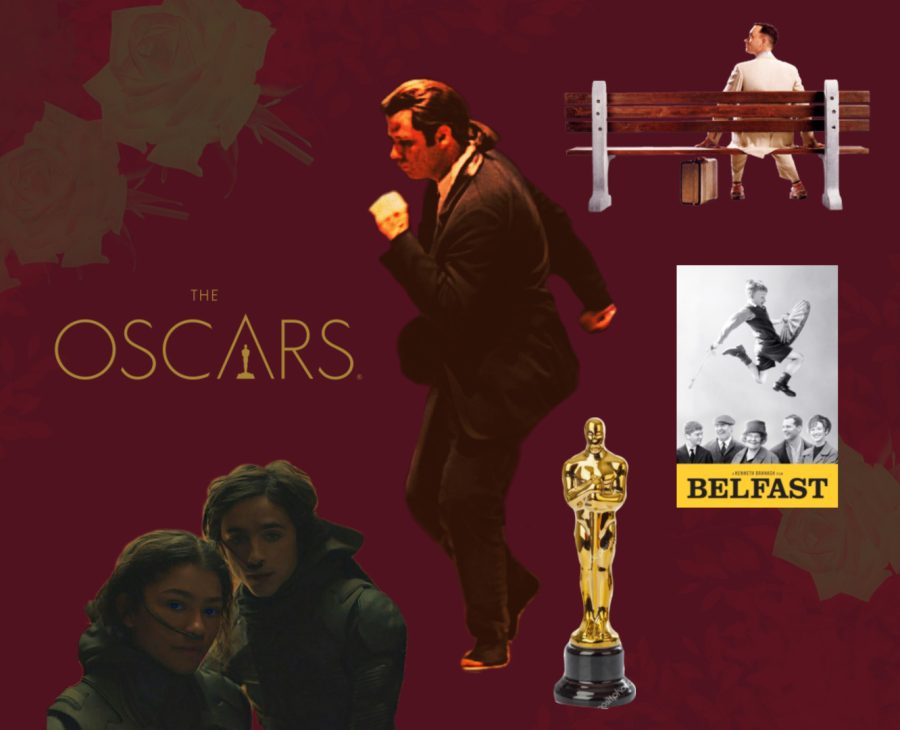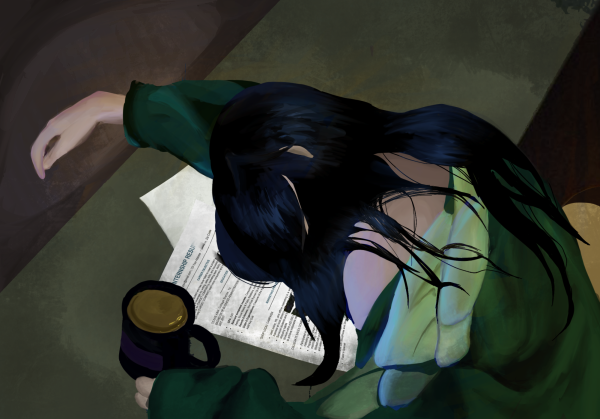My Thoughts on Oscars Season, Ft. Top 5 Oscar Snubs
Infamous Academy snubs, and fan favorites.
Last weekend, my dad took me to go see Dune (2021), a sci-fi adventure film starring some of my favorite actors, Timothée Chalamet and Zendaya. Even though Dune came out in October of last year, we decided to go out to the Rheem theater because it just got revamped with new automated recliners and brand new surround-sound. However, there was 1 more reason he suggested we go on our theater outing: “It got nominated for best picture this year,” he told me. That’s right, Oscar season is upon us, so let’s look back on that very 1st awards ceremony at the Hollywood Roosevelt Hotel, 1929, to see how this whole thing has (or hasn’t) changed.
I don’t want to discredit the Academy because it’s true that, more often than not, winners are deserving of their awards. However, this doesn’t mean there isn’t a general formula. As long as you know the rules of the game, Oscars aren’t that hard to win, and the key is in the statistics. For example, historically, 93% of best picture films are dramas while only 2% are action and fantasy. Longer films are also usually the way to go, considering 76% of best picture films since 1960 have been over 2 hours long. Perhaps most importantly, the Academy tends to lean towards movies that have been commercially and critically successful. Around 80% of all best picture winners have a critic’s and audience rating above 80.
All in all, the Academy almost always goes with a safer bet, rather than choosing movies that try to go for something different and hear out some more creative voices and perspectives. I mainly think the Academy opts for what it deems the most “important” film of that year, and even then, monumental works of cinema such as Stanley Kubrick’s 2001: A Space Odyssey (1968) or Alfred Hitchcock’s Psycho (1960) were never even nominated. And this leads to fatigue; fewer and fewer people are watching and the Academy has no one to blame but themselves.
It is important to mention why companies want these awards, aside from reasons regarding prestige and recognition from the film community. As seen in my dad’s proposal to go see Dune, movies that receive awards and nominations appeal immensely to the public, prompting movie-lovers to buy tickets, streaming subscriptions, or both.
So, as a tradition meant to represent the best of the industry, is the Oscars a celebration of great achievement in filmmaking or is it just corporate, business strategy amongst different studios competing for the highest profit?
Either way, the annual Oscars are a tradition nonetheless, and the event will always serve as a source of nostalgia for a lot of people, especially those who have most thoroughly seen the film world’s evolution. It’s hard not to get swept up in all the old Hollywood glamor as ceremonies reference cinema legends such as Ingrid Bergman and Humphrey Bogart from the renowned Casablanca (1942).
Despite the glitz and glam, there’s 1 more thing that may be pushing people away from tuning in to this year’s 94th Academy Awards ceremony: Oscar snubs. “What received too much attention?” “They had the audacity to nominate…?” Movies are so incredibly subjective, but sometimes, the approach the Oscars take to choosing the “best” of the year is simply unbearable. The Oscars have been wrong a great many times, but there are a few that stand out to me more than others. Here are, in short, my top 5 Oscar travesties.
(DISCLAIMER: By no means are any of these necessarily bad films or artistically unaccomplished; I simply think some contenders were more deserving than others. Many of my opinions have to do with how these films have aged over the years and if they have maintained and/or had an increased impact on pop culture and society as a whole. Like I said before, movies are anything but objective, and what constitutes an “Oscar winner” depends on who you are and what personally entertains you.)
P.S. Where is “Saving Private Ryan” on this list? The answer is simple: too controversial!
#5 The Social Network loses to The King’s Speech (2010)
2010 was an exceptional year for movies. We got psychological thrillers like Inception and Black Swan, as well as dramatic adventure films such as 127 Hours and True Grit. But a Facebook movie? Who’d want to see that? A lot of people, apparently. As the poet laureate of American screenwriting, Aaron Sorkin’s genius strikes again, portraying the origin story of Facebook through a compelling tragedy of youth, power, and jealousy. Though already proven his mastery in previous works such as Se7en and Zodiac, director David Fincher doesn’t fall short either. To put it simply, The King’s Speech is what cinephiles call “Oscar bait”. An eminently likable story about a stuttering king (Colin Firth) and his speech therapist (Geoffrey Rush), The King’s Speech hits every moving and inspirational beat the Academy loves dearly. On the other hand, The Social Network isn’t perfect, but name another movie that so expertly captured an era. The Social Network only seems to age better and better as Facebook (or “Meta”, sorry) continues to make headlines for all the wrong reasons.
#4 No nomination to Spielberg for Jaws (1975)
If the Academy claims to reward “important” movies, this one really leaves me scratching my head and wondering what went wrong. The impact of Jaws is so incredibly vast not just in the realm of suspenseful thriller flicks, but in the world of film in its entirety. For starters, Jaws gave rise to the blockbuster, created the prototypical summer movie season, and let Steven Spielberg take his unique vision to the world. Speilberg forever evolved the formula for Hollywood films and changed how studios approached movies; elements of its craft absolutely remain present in modern filmmaking. Well, that and he also accomplished the feat of rendering audiences quite literally horrified by a Great White Shark that only has about 4 minutes of actual screen time, according to Yahoo. Despite being frankly a watershed moment in motion picture history, a best director nomination wasn’t thrown Steven Spielberg’s way at the ceremony in 1975. Perhaps we will see Spielberg take home a best director award this month for his upcoming West Side Story remake.
#3 Art Carney over Pacino & Nicholson (1975)
Sometimes, the Academy gives out an Oscar more for a person’s career, rather than the performance, and that has to have been what happened here. There’s really no other plausible explanation for how Art Carney in Harry and Tonto won best actor over Al Pacino in The Godfather Part II and Jack Nicholson in Chinatown. Widely regarded as the best on-screen performance to date, Pacino makes it look easy. The story offers a realistic perspective to the dark side of power and vice; Michael Corleone’s fall from grace is riveting and compelling to watch, and his performance manages to make the film’s predecessor (Godfather I) even better. Furthermore, appearing in quite literally every scene, Jack Nicholson perfects the role of an obsessive private detective with a remarkable performance in the neo-noir, Chinatown. For movies with such profound effects, Carney’s triumph is all the more painful as he (who even remembers Harry and Tonto?) takes the cake over some of the greatest performances to ever hit the cinemas.
#2 Goodfellas loses to Dances with Wolves (1991)
Martin Scrosese’s Goodfellas is among my top 3 favorite movies of all time, so I’m going to get it out of the way by saying I may be a little biased. Nonetheless, Dances With Wolves was quite frankly an Oscar trap — a gorgeous, sweeping western epic, directed by and simultaneously starring one of the hottest names at the time (Kevin Costner). However, Goodfellas was Martin Scorsese’s masterpiece — a dark yet funny, anthropological take on mob life that paved the way for a fan-favorite, The Sopranos. Some people mock Dancing With Wolves now, but the truth is, it’s actually alright. Problem is, Goodfellas is quite literally 1 of the greatest movies ever made. Not naming Goodfellas best picture (or Scorsese best director — which is another travesty in itself) isn’t just a mistake, it’s something worth getting whacked for (bad joke). Also, rewarding Scorsese back in 1991 would have lifted the pressure off the Academy to over-reward his perfectly acceptable but far from groundbreaking The Departed 16 years later.
#1 Pulp Fiction loses to Forrest Gump (1995)
I’m going to be a little harsh: Forrest Gump is a mawkish, condescending piece of cheap tone-deaf manipulation (or according to the Reddit army, “right-wing propaganda”) despite the fact that it absolutely crushed at the box office. Forrest Gump taking this 1 is in my opinion, the worst Oscar travesty of all time — especially in the year of the incredibly creative, mind-bending Pulp Fiction, which remains 1 of the most influential and important movies in cinematic history, as well as in the profound career of Quentin Tarantino himself. Honestly, Pulp Fiction kind of changed everything. This brutally nihilistic, self-referential slice of postmodern American filmmaking shook things up in a way that filmgoers hadn’t yet experienced. Whatever your take on Forrest Gump may be, you have to agree Robert Zemeckis’s cloying drama is not unlike a lot of his films, offering up some big crowd-pleasing moments alongside some self-explanatory and naïve commentary. Pulp Fiction on the other hand, with its unconventional structure, searing dialogue, infectious surf-rock soundtrack, and stylised violence was truly a new and exhilarating experience for viewers at the time. Better yet, the film has continued to have that same effect on audiences over 20 years later. Furthermore, I think Tom Hanks delivers his character, Forrest, in a more than mildly annoying performance. Hanks even managed to pull off best actor with his role as the decent simpleton from Alabama who appears to have stopped developing mentally at the age of 8 when faced with social hindrances. Nonetheless, I want to reiterate that Forrest Gump isn’t necessarily a bad film, but it can’t be compared to Pulp Fiction, simply because the 2 works are so incredibly different.
I think the defeat of Pulp Fiction is perhaps the greatest testament to the true nature of the Oscars, which is seemingly unwelcoming of anything different; anything that breaks the strict and pretty unforgiving mold of movie standards and expectations. This mold may be loosening up a little bit, but its origins will never change, making implicitly biased and discriminatory manners that much harder to dismantle. In 2016, many members of the film community even decided to boycott the award ceremony because of the lack of diversity among nominees, something we may see happen more and more. I hope the Academy will acknowledge that although it cannot change the past, it can strive to be more inclusive in the future.
Your donation will support the student journalists of Campolindo High School's The Claw. Your contribution will allow us to produce more issues and cover our annual website hosting costs.

Senior Josie Doran loves listening and creating music, specifically pop, directing, and playing with her dog. Her mom is an important influence in her...


